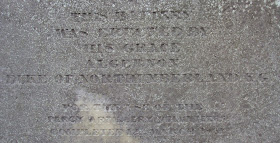The Duke of Northumberland agreed to the formation of the Percy Artillery Company of the Northumberland Volunteers. The members had noted the Tynemouth Artillery practised on the North side of the Castle at Tynemouth, and proposed to adopt a similar practise by firing from the sands near Alnmouth.
 |
| Percy Artillery Volunteers Badge |
 |
| Percy Artillery Battery Alnmouth |
 |
| Commemoration stone detailing the opening of the battery in 1861 by the Duke of Northumberland |
 |
| Percy Artillery Battery |
The Battery is located to the north east of Alnmouth on top of an escarpment looking out to sea. As well as the battery, the battery hostel nearby provided accommodation.
 |
| Alnmouth Coast Percy Battery |
 |
| Battery Hostel Alnmouth |
The Corps expanded to 8 batteries by 1868 with drill stations around
north Northumberland. Over the next 32 years the number of drill stations
expanded and contracted, and batteries were disbanded and formed.
In 1902 it was re designated 2nd Northumberland (Percy Artillery) RGA Volunteers, when the Royal Artillery re-organised. The Percy Artillery found themselves with drill stations too scattered to sustain position artillery role, and with no suitable forts nearby, they were unable to operate as garrison artillery. The Corps disbanded in 1902.
In 1902 it was re designated 2nd Northumberland (Percy Artillery) RGA Volunteers, when the Royal Artillery re-organised. The Percy Artillery found themselves with drill stations too scattered to sustain position artillery role, and with no suitable forts nearby, they were unable to operate as garrison artillery. The Corps disbanded in 1902.
 |
| St John the Baptist Church Alnmouth |
 |
| Church Hill Alnmouth |
To the south of Alnmouth lies Church Hill. Originally connected to Alnmouth, the River Aln went around the hill until 1806 when the great storm changed the course of the Aln, cutting the church off from Alnmouth, leaving it on the south bank.
At 19:20 8th November 1941, a bomb fell on Argyle Street. Three houses were demolished and seven people killed. They are commemorated on the villages war memorial.
 |
| Argyle Street bombed November 1941 |
 |
| Argyle Street 2012 |
 |
| Alnmouth War Memorial |
 |
| Those lost 8th November 1941 |


